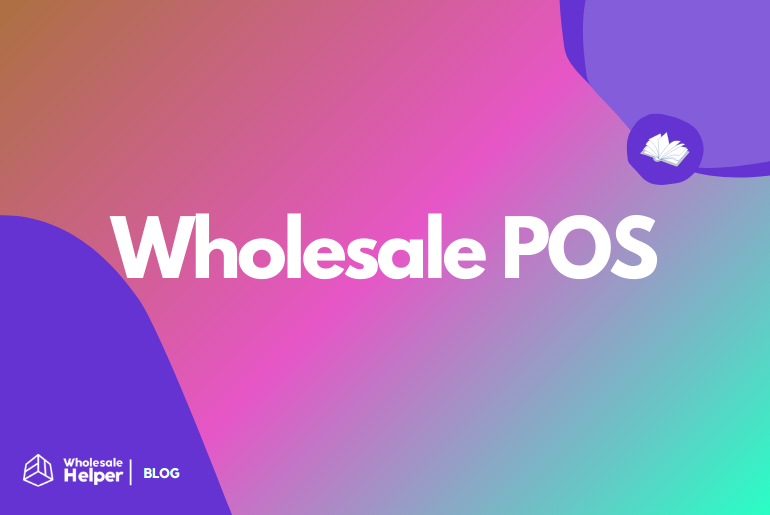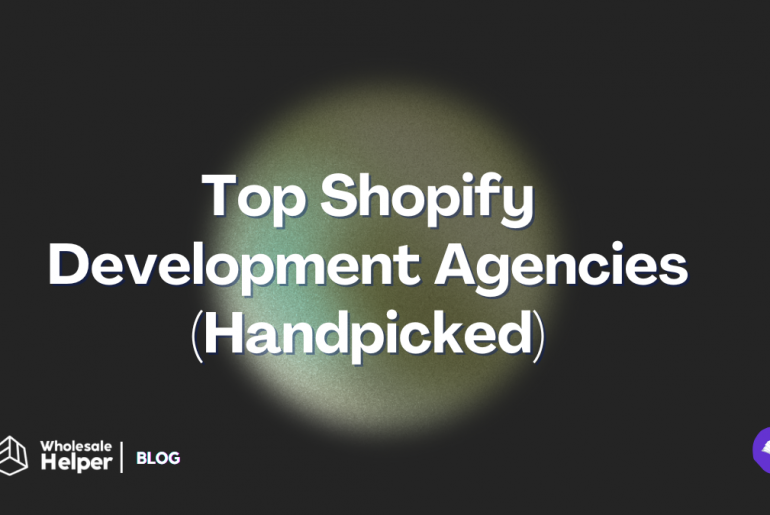Running a wholesale business isn’t for the faint of heart. Bulk orders, complex pricing structures, and sprawling inventory can spin your head. But what if there was a tool built primarily to take on those challenges? That’s Wholesale POS.

Just imagine stress-free ordering, real-time updating inventory, and pricing calculations that no longer give you nightmares. You see, a wholesale POS system isn’t your average cash register. It was born to be the workhorse best friend that gets what goes on in running your business daily.
So, if you’re interested in how this game-changing technology can revolutionize your operations, increase your bottom line, and maybe even let you catch your breath? Ok then, let’s see how the POS system for wholesale business stacks up to the plate for your business.
What is Wholesale POS?
A Wholesale POS (Point of Sale) system is a software solution built specifically to meet the requirements of wholesale business operations.
While typical retail POS systems can only handle individual transactions at the consumer level, Wholesale POS systems are geared towards managing business-to-business (B2B) transactions, where businesses sell products in bulk to other companies instead of selling directly to consumers.

Differences between POS for B2B and POS for B2C
Wholesale businesses, more often than not, deal with B2B as well as B2C customers, but their significant operations revolve around B2B. Hence, it becomes imperative for a POS System to be able to deal with both these complexities, especially the B2B ones. Let’s break down the key differences and requirements.
| Criteria | B2B POS | B2C POS |
| Customization and flexibility | Require customization for handling bulk orders, tiered pricing structures, and client-specific terms. | Need flexibility for implementing various promotional offers and loyalty programs tailored to individual consumers. |
| B2B-specific features | Dropshipping management, Purchase order functionality, Supplier management tools, Advanced order fulfillment capabilities | Not required |
| Inventory management | Require more robust inventory management for bulk quantities, multiple warehouses, and integration with supplier inventories. | Focus on individual item tracking and real-time stock updates for retail environments. |
| Pricing and discounts | Need support for complex pricing structures, including volume-based discounts, client-specific pricing, and negotiated rates. | Typically deal with fixed pricing and general promotions. |
| Payment processing | Require support for invoicing, credit terms, and bulk payments. | Emphasize quick transactions with various payment methods (cash, credit cards, mobile payments). |
| Reporting and analytics | Need more comprehensive reporting on large orders, client accounts, and supply chain analytics. | Focus on individual transaction data, consumer behavior, and retail-specific metrics. |
| User interface | May include more complex interfaces to handle detailed order entry, client account management, and inventory operations. | Designed for quick, intuitive use in fast-paced retail environments. |
When you run a wholesale business, you must realize that POS systems are different for B2B than for B2C. Both are meant to make sales, but they have different roles.
- In B2B, POS deals with complex processes and, more so, in the wholesale distribution software and manufacturing industry. It should be able to manage complex processes such as dropshipping, purchase orders (PO), supplier management, and fulfillment features. All these would ensure that large orders and bulk transactions are handled, which is very important in B2B.
- In contrast, B2C POS systems are designed to process transactions of single customers much easier and faster. These systems are designed to focus on fast transactions and customer experience, and they provide features such as quick checkout, easy refund, customized promotions, and a retail customer loyalty program.
- Also, many wholesale businesses cater to B2B and B2C clients — and you’ll need a POS system that does the same. You’ll want to be able to run different promotions and loyalty schemes for your one-off, big-bucks, B2B customers and your repeat, consumer subscription-based customers. And you won’t want it slowing you down, either.
How Wholesale POS handles your business’s unique demands
Wholesale companies have special needs and thus need specialized POS solutions. A powerful Wholesale POS software meets these needs through various advanced functionalities such as inventory management, warehouse management, supplier management tools, and B2B-specific capabilities.
A. Advanced inventory management
- Multi-location tracking: Track stock counts across multiple warehouses or in-store locations. A wholesale POS inventory management system centralizes your inventory so you can manage and track your inventory in one place.
- Batch and serial number tracking: You can track specific batches of products or even individual items using serial numbers, making recalls, warranties, or quality control more straightforward to manage. Companies can also utilize FIFO (First-In-First-Out) or LIFO (Last-In-First-Out) methods, which will greatly increase accuracy and traceability in the supply chain.
- Bin location management: Organize your warehouse by assigning specific bin locations to products so that you can easily find and access them when fulfilling orders.
- Cash and carry inventory management: Manage inventory so that cash and carry are possible. It enables quick turnover of merchandise and immediate sales to customers who pay for and take the merchandise home.
B. Warehouse Optimization
- Pick, pack, ship automation: Automate the picking, packing, and shipping process to reduce manual errors and speed up order fulfillment. The feature generates optimized picking lists to prepare orders faster and handles packing slips and shipping labels. It even connects with your shipping carriers for seamless logistics.
For wholesale businesses dealing with large orders, outsourcing to a 3PL fulfillment provider can streamline operations and reduce overhead costs. A 3PL partner offers expertise in logistics, warehousing, and shipping, enabling companies to focus on sales and customer service. By integrating 3PL services with your wholesale POS system, you can automate inventory updates, order processing, and delivery tracking, ensuring efficient and accurate fulfillment. This partnership helps meet high customer expectations and reduce errors in shipping and handling. - Real-time stock updates: Get real-time visibility, which provides instant updates on stock levels as sales occur, triggers automated reorder points to maintain optimal inventory levels, and syncs inventory data across all sales channels (eCommerce, in-store, etc.).
C. Supplier Management Tools
- Purchase order automation: This one will create and send POs based on stock levels and sales forecasts. It also monitors the status of purchase orders created up to delivery and assists with matching received goods against a PO for accurate stock intake.
- Supplier performance tracking: Tracking the performance of your suppliers is another valuable tool that monitors supplier reliability, delivery times, and order accuracy. It allows businesses to compare pricing across suppliers for cost optimization and manages supplier contracts and negotiated terms.
D. B2B-Specific Features
- Dropshipping capabilities: It automates shipment advice for orders shipped from the supplier directly to the end customer, automates communication between retailer and supplier (and customer), tracks dropshipping orders, and reconciles supplier invoices.
- Fulfillment process management: Wholesale POS solution handles complex B2B order fulfillment requirements. The feature is ideal for companies who manufacture for other businesses, giving features of partial shipments, multi-locations, and backorders.
Moreover, you can manage ordering products your business clients need by ordering departments. Today, most companies source products from competition via indirect or direct sourcing along with this function.

3 factors to consider for the right Wholesale POS System for your businesses
Selecting the right Wholesale POS system is a crucial decision for any business, and finding the perfect fit requires carefully evaluating several vital factors. Here’s what you should consider to ensure the system meets your unique needs:
1. Business size and scale
The size and scope of your wholesale system will significantly influence what type of POS system is best for your business. Many small- to medium-sized wholesalers surveyed said scalability was a top consideration when choosing a POS system.
For small businesses (annual revenue < $5 million):
- Look for wholesale software for small businesses that provide core features such as inventory management and basic reporting.
- Try cloud-based solutions, which SMBs prefer because they can lower upfront costs by up to 25% per year and easier maintenance.
- User-friendly interfaces should be a top priority as small business owners handle their POS systems.
For medium-sized businesses (annual revenue $5-50 million):
- Seek more robust features like a wholesale pos system for iPad, advanced analytics, and multi-location management.
- Look for integration capability with other business systems (e.g., ERP, CRM)
- Consider wholesale systems that can handle higher volumes. The average medium-sized wholesaler processes 500-5000 orders per month.
For large enterprises (annual revenue > $50 million):
- Require more feature-rich solutions that offer more customization options.
- Large wholesalers need a system to handle complex pricing structures and high-volume inventory (over 10,000 SKUs).
- Look for advanced features that rely on AI for supply chain forecasting and real-time visibility.
2. Specific industry needs
Different wholesale sectors have unique requirements. As a wholesaler, we believe industry-specific features are “very important” or “crucial” in POS selection.
Food and beverage:
- Require lot tracking and expiration date management
- Need FSMA (Food Safety Modernization Act) compliance features
Electronics and technology:
- Must have serial number tracking for warranty management
- Need support for rapidly changing pricing due to market fluctuations
Apparel and textiles:
- Require size/color/style matrix inventory management
- Include season-based forecasting capabilities and a wholesale planning system
Industrial and construction supplies:
- Support for bulk and dimensional (length, width, height) pricing
- Need integration with project management tools and wholesale management system
3. Budget and cost considerations
Considering all the factors, budget is also one of the most important factors when choosing the right POS for your wholesale and retail business. It’s crucial to find a solution that provides a high return on investment but doesn’t overextend your resources. The average wholesale business spends 5-10% of its annual revenue on POS systems.
Consider these cost-specific factors:
- Upfront vs. ongoing costs: Many POS systems may have low upfront costs but higher long-term costs, such as monthly subscriptions, maintenance, or add-on fees. And don’t forget to compare the total cost of ownership, including wholesale POS hardware, software, and support.
- Cloud vs. on-premise: Cloud POS systems generally have lower upfront costs and are easier to scale, but you’ll pay subscription fees indefinitely. On-premise solutions may require a more considerable initial investment, but you have more control over long-term costs.
- Hidden costs: You should beware of any hidden costs such as transaction fees, charges related to payment processing, or expensive integrations with third-party apps. Knowing what you’re in for financially can save headaches further down the line.
The bottom line
We all know running a wholesale business can take a lot of work. However, the right Wholesale POS system can help alleviate some of that stress by automating tasks, reducing errors, and increasing profits. If you have to handle bulk orders, intricate price lists, or high inventory quantities, finding the right technology to suit your needs is paramount.
At Wholesale Helper, we have the best software for wholesale business, trusted by over 12,000 merchants. Our company offers end-to-end solutions for B2B eCommerce platforms and pricing tools that help you handle bulk orders, track inventory effectively, automate complicated tasks, etc.

Ready to transform your business? Visit our website to learn more about how our services can help you scale your business and streamline your operations. Also, be sure to read our blog for more tips about wholesale and e-commerce to grow your online business. Thank you for reading!




![Shopify B2B: Build All-in-One B2B Store [2026 Guide] Shopify B2B article featured image](https://wholesalehelper.io/blog/wp-content/uploads/2023/04/Shopify-B2B.png)



